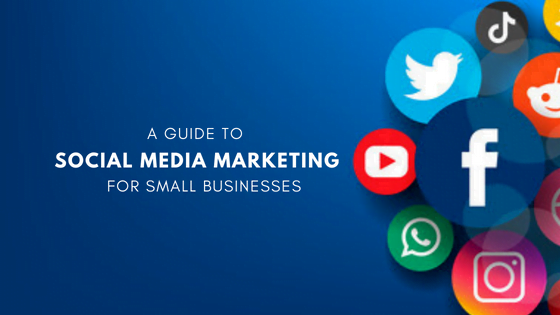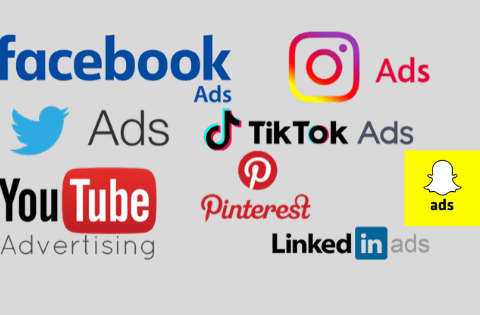Social Media: A Marketing Guide for Small Businesses

Social media to engage with customers interested in their services is fun and affordable for businesses. A social media marketing strategy needs to be established first.
Social media marketing is an excellent way for small businesses to increase their customer base. It’s an approach that is reasonably priced and capable of reaching millions of people. Despite all these advantages, many business owners are unclear about how to use social media or where to start.
Whether you’re a small business owner managing your accounts or you oversee social media for a local firm, keep reading for helpful advice on how to use social media for small business marketing. This article outlines the foundations of social media marketing that every small business should be aware of-
Social Media Advantages For Small Businesses
As a small businessman, you have a lot to handle. You probably don’t want to add video marketing to your list of responsibilities, especially if you don’t know anything about video and don’t know where to start.
Many entrepreneurs and owners of small businesses are afraid to employ video marketing as they think it will be too complicated, time-consuming, or costly. It’s not only you: according to 16% of non-video advertisers and 17% of those who do, not using video marketing results in a lack of time and high costs.
People routinely prefer small businesses over household names because they value the establishments’ individualized service and distinctive character. Social networking can help you expand your business while showcasing your personality and becoming acquainted with your clients better.
1. Establishing Connections With Your Audience
Share helpful material on social networks to boost user engagement and brand loyalty. You’ll succeed if you follow the appropriate procedures, maintain active communication, and give your all to the effort.
Simply put, this is a terrific approach to establishing connections with your audience and winning over repeat customers.
2. It’s Simpler To Get Client Feedback
Having a social media presence makes it simpler to obtain customer feedback. You can respond to their inquiries and create discussions about subjects about your goods and services through direct messages and postings.
By doing this, you may give your clients better support and enhance their interaction with your company.
3. Various Methods Of Company Promotion
You can use many social media sites for marketing your small business, and each presents a new opportunity. Use the ones that are most effective for you and your target audience to connect with more people.
4. Acting As A Platform For Client Service
Along with the conventional contact center, social media can be used for customer support. You’ll gain from this, especially if your company is small and has the funding necessary to hire a team of customer care representatives.
Along with generating the content, social media profiles that respond to queries and offer assistance will help you forge closer connections with your audience. This might also assist you in averting any future emergency circumstances.
Tips For Small Businesses On Social Media Platforms
People frequently favor tiny businesses over household names because they value the establishments’ individualized service and distinctive character. Social networking can help you expand your business while showcasing your personality and getting to know your clients better.
You can market your brand in elegance and make videos for all the major social media platforms with the help of helpful social media advice. You can get all the information you require here, even if all you need help with is picking the ideal profile photo for your accounts-
1. Develop a Strategy
Doing proper research and developing a solid strategy is the first and foremost step. Defining measurable, doable, and pertinent goals and objectives for your social media strategy are essential to achieving your company’s objectives. It would be best to make a social media schedule once you have a sound content strategy to help you stay organized.
These are typically available as a default option in the scheduler of social media management systems. (Bonus: most scheduling software has analytics features that let you see which content is doing the best for you.) If you create free business accounts on your social media sites, you can also track the effectiveness of your material.
2. Decide Which Statistics Are Important
Choose the metrics that are important to you and your business before you start running reports. Avoid getting sucked into vanity metrics—metrics that give you a pleasant feeling but don’t aid decision-making, action-taking, or value assessment. Although it can be tempting to become fixated on followers and likes, these statistics may not always be helpful to your company’s objectives.
Local businesses, for instance, benefit more from a tiny, local following than a large one that consists of people who would never go to the firms’ actual stores. Because social media managers find it challenging to persuade the company of its importance, social media is frequently among the first things small businesses cut. This is why it’s so important to concentrate on the appropriate measurements.
You may not be impressed by the number of likes your post receives, but you will undoubtedly be curious about the number of sales it generates. Sales figures aren’t the only helpful metric, of course. You may also keep an eye on the traffic that social media channels send to your website, the levels of engagement for individual articles, or even particular forms of interaction, like retweets vs. likes.
Every statistic can provide you with information, but that information’s value depends on whether it aids in business decision-making.
3. Analyze Reports to See What Is Working
Once you’ve chosen your key performance indicators, monitor them frequently by creating unique reports highlighting your priorities. Keep in mind to concentrate on data that informs business decisions, such as measurements that show whether Instagram Shop Post or Grid content generates more sales.
Examine the social media strategies employed by your rivals and note what is and is not practical. While you shouldn’t duplicate others, you can still benefit from their experience by refining your approach. Don’t forget to look at temporary posts on Snapchat and Instagram Stories.
While it’s crucial to keep an eye on what your rivals are doing, you should also look at reputable companies outside your sector. Consider what makes these brands appealing and draw ideas from them for your small company marketing plan.
4. Choose the Right Social Media Channels
Investigate your target market carefully. Consider your audience and where they spend the majority of their time. You can use this to determine if you require a Facebook page or a TikTok account.
5. Focus On Increasing Sales
After identifying your target market, it’s time to review your social media strategy to determine how to contact more people who share their interests. You can contact new potential consumers who meet your target audience through paid advertising like Facebook ads or a temporary offer, ultimately enhancing your chances of making sales.
6. Establish Connections with Your Clients
You may gain trust and amass a devoted following by interacting with your social media followers. Your brand exposure grows as you climb the social algorithms as more followers interact with your content by liking, commenting, and sharing. More interaction with your material increases exposure and may bring in new readers.
7. Utilize Social Commerce to Market Your Products
Social commerce, or the possibility of selling items directly through social networks, is a relatively new concept in social media marketing, and trade is expanding, with a global market price of $89.4 billion in 2020. By June 2020, 18.3 percent of American adults had done so on Facebook, while 11.1 percent had done so on Instagram. You can now market your products and services via social shopping platforms even if you don’t have a website.
8. Encourage User-Generated Content
User-generated content (UGC) is the term for social media posts that users from all over the world share while they are using or gushing about a product or service. The prominence and accessibility of UGC on social media have made it popular in the world of digital marketing.
The Nielsen Consumer Trust Index shows that 92% of consumers place greater confidence in user-generated material than in traditional marketing. UGC is viewed as being more accurate and sincere as a result. Another fantastic approach to interact with your audience and obtain some free material is through contests and branded hashtags. Tag and mention your followers when sharing other people’s material to build stronger bonds with your largest supporters.
9. Pay Attention to Trends
Pay attention to social media trends so you can produce appropriate material for your audience that is both interesting and relevant. Instead of following every trend, focus on the ones that will resonate with your audience and increase consumer engagement.
10. Change the Video Marketing Format
Use a video maker to create a quick, personalized thank-you video for a customer, a brief demo video showcasing your product, or a casual interview with a service team member.
These are all effective and easy ways to use video marketing to build brand awareness and loyalty and advance customers through the purchase process. Posting static photographs can become monotonous. Add GIFs, boomerangs, behind-the-scenes material, customer tutorials, user-generated content, live videos, etc., to spice up the video.
To spice up the video, use GIFs, boomerangs, behind-the-scenes footage, customer tutorials, user-generated content, live videos, etc. To determine what works best for you, try out all the content formats each social media platform offers and upload various content.
11. Monitor Your Effectiveness and Make Improvements
If you don’t monitor what succeeds and fails in social media, all of your efforts will be for naught. Track your small business’s most crucial social KPIs using social media analytics tools. Just remember to adjust your plan in light of your findings.
Conclusion:
For social media marketing to be effective, you must develop and follow a plan. Although our advice would provide anyone with a solid starting point, it’s crucial to adapt your strategy to the circumstances.
Small companies may utilize social media marketing to expand their client and boost sales, but only if they know how to do it well. You may quickly become an expert at social media marketing if you’ve already made the bold decision to launch a business. You are just a few clicks away from arming yourself with the resources you need to demonstrate the seriousness of your company.
It’s normal to feel afraid at first, so don’t be upset if you do. Be patient and take your time. The rewards won’t be apparent immediately, but if you stick to your plan and put in the work, you’ll be well on your way to building a solid social media presence.

